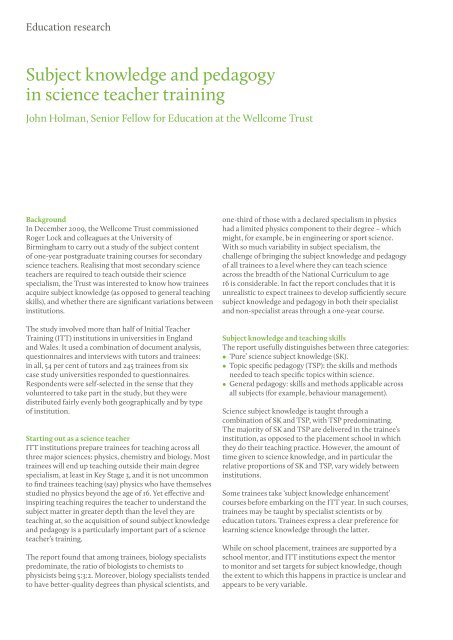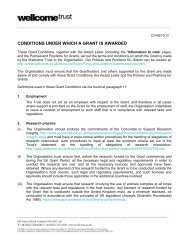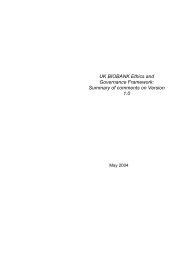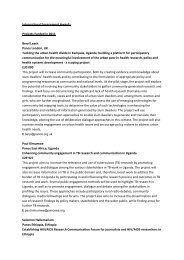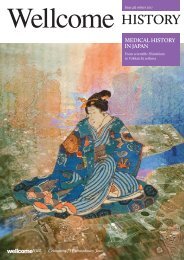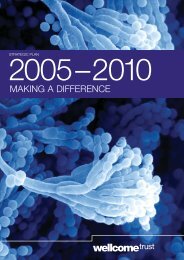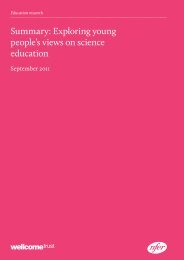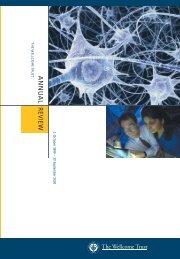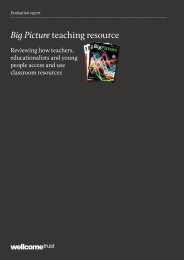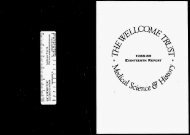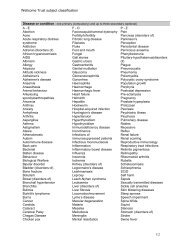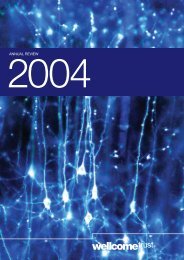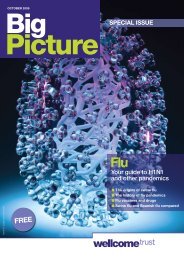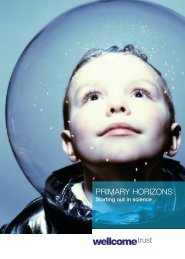Subject knowledge and pedagogy in science ... - Wellcome Trust
Subject knowledge and pedagogy in science ... - Wellcome Trust
Subject knowledge and pedagogy in science ... - Wellcome Trust
You also want an ePaper? Increase the reach of your titles
YUMPU automatically turns print PDFs into web optimized ePapers that Google loves.
Education research<br />
<strong>Subject</strong> <strong>knowledge</strong> <strong>and</strong> <strong>pedagogy</strong><br />
<strong>in</strong> <strong>science</strong> teacher tra<strong>in</strong><strong>in</strong>g<br />
John Holman, Senior Fellow for Education at the <strong>Wellcome</strong> <strong>Trust</strong><br />
Background<br />
In December 2009, the <strong>Wellcome</strong> <strong>Trust</strong> commissioned<br />
Roger Lock <strong>and</strong> colleagues at the University of<br />
Birm<strong>in</strong>gham to carry out a study of the subject content<br />
of one-year postgraduate tra<strong>in</strong><strong>in</strong>g courses for secondary<br />
<strong>science</strong> teachers. Realis<strong>in</strong>g that most secondary <strong>science</strong><br />
teachers are required to teach outside their <strong>science</strong><br />
specialism, the <strong>Trust</strong> was <strong>in</strong>terested to know how tra<strong>in</strong>ees<br />
acquire subject <strong>knowledge</strong> (as opposed to general teach<strong>in</strong>g<br />
skills), <strong>and</strong> whether there are significant variations between<br />
<strong>in</strong>stitutions.<br />
The study <strong>in</strong>volved more than half of Initial Teacher<br />
Tra<strong>in</strong><strong>in</strong>g (ITT) <strong>in</strong>stitutions <strong>in</strong> universities <strong>in</strong> Engl<strong>and</strong><br />
<strong>and</strong> Wales. It used a comb<strong>in</strong>ation of document analysis,<br />
questionnaires <strong>and</strong> <strong>in</strong>terviews with tutors <strong>and</strong> tra<strong>in</strong>ees:<br />
<strong>in</strong> all, 54 per cent of tutors <strong>and</strong> 245 tra<strong>in</strong>ees from six<br />
case study universities responded to questionnaires.<br />
Respondents were self-selected <strong>in</strong> the sense that they<br />
volunteered to take part <strong>in</strong> the study, but they were<br />
distributed fairly evenly both geographically <strong>and</strong> by type<br />
of <strong>in</strong>stitution.<br />
Start<strong>in</strong>g out as a <strong>science</strong> teacher<br />
ITT <strong>in</strong>stitutions prepare tra<strong>in</strong>ees for teach<strong>in</strong>g across all<br />
three major <strong>science</strong>s: physics, chemistry <strong>and</strong> biology. Most<br />
tra<strong>in</strong>ees will end up teach<strong>in</strong>g outside their ma<strong>in</strong> degree<br />
specialism, at least <strong>in</strong> Key Stage 3, <strong>and</strong> it is not uncommon<br />
to f<strong>in</strong>d tra<strong>in</strong>ees teach<strong>in</strong>g (say) physics who have themselves<br />
studied no physics beyond the age of 16. Yet effective <strong>and</strong><br />
<strong>in</strong>spir<strong>in</strong>g teach<strong>in</strong>g requires the teacher to underst<strong>and</strong> the<br />
subject matter <strong>in</strong> greater depth than the level they are<br />
teach<strong>in</strong>g at, so the acquisition of sound subject <strong>knowledge</strong><br />
<strong>and</strong> <strong>pedagogy</strong> is a particularly important part of a <strong>science</strong><br />
teacher’s tra<strong>in</strong><strong>in</strong>g.<br />
The report found that among tra<strong>in</strong>ees, biology specialists<br />
predom<strong>in</strong>ate, the ratio of biologists to chemists to<br />
physicists be<strong>in</strong>g 5:3:2. Moreover, biology specialists tended<br />
to have better-quality degrees than physical scientists, <strong>and</strong><br />
one-third of those with a declared specialism <strong>in</strong> physics<br />
had a limited physics component to their degree – which<br />
might, for example, be <strong>in</strong> eng<strong>in</strong>eer<strong>in</strong>g or sport <strong>science</strong>.<br />
With so much variability <strong>in</strong> subject specialism, the<br />
challenge of br<strong>in</strong>g<strong>in</strong>g the subject <strong>knowledge</strong> <strong>and</strong> <strong>pedagogy</strong><br />
of all tra<strong>in</strong>ees to a level where they can teach <strong>science</strong><br />
across the breadth of the National Curriculum to age<br />
16 is considerable. In fact the report concludes that it is<br />
unrealistic to expect tra<strong>in</strong>ees to develop sufficiently secure<br />
subject <strong>knowledge</strong> <strong>and</strong> <strong>pedagogy</strong> <strong>in</strong> both their specialist<br />
<strong>and</strong> non-specialist areas through a one-year course.<br />
<strong>Subject</strong> <strong>knowledge</strong> <strong>and</strong> teach<strong>in</strong>g skills<br />
The report usefully dist<strong>in</strong>guishes between three categories:<br />
• ‘Pure’ <strong>science</strong> subject <strong>knowledge</strong> (SK).<br />
• Topic specific <strong>pedagogy</strong> (TSP): the skills <strong>and</strong> methods<br />
needed to teach specific topics with<strong>in</strong> <strong>science</strong>.<br />
• General <strong>pedagogy</strong>: skills <strong>and</strong> methods applicable across<br />
all subjects (for example, behaviour management).<br />
Science subject <strong>knowledge</strong> is taught through a<br />
comb<strong>in</strong>ation of SK <strong>and</strong> TSP, with TSP predom<strong>in</strong>at<strong>in</strong>g.<br />
The majority of SK <strong>and</strong> TSP are delivered <strong>in</strong> the tra<strong>in</strong>ee’s<br />
<strong>in</strong>stitution, as opposed to the placement school <strong>in</strong> which<br />
they do their teach<strong>in</strong>g practice. However, the amount of<br />
time given to <strong>science</strong> <strong>knowledge</strong>, <strong>and</strong> <strong>in</strong> particular the<br />
relative proportions of SK <strong>and</strong> TSP, vary widely between<br />
<strong>in</strong>stitutions.<br />
Some tra<strong>in</strong>ees take ‘subject <strong>knowledge</strong> enhancement’<br />
courses before embark<strong>in</strong>g on the ITT year. In such courses,<br />
tra<strong>in</strong>ees may be taught by specialist scientists or by<br />
education tutors. Tra<strong>in</strong>ees express a clear preference for<br />
learn<strong>in</strong>g <strong>science</strong> <strong>knowledge</strong> through the latter.<br />
While on school placement, tra<strong>in</strong>ees are supported by a<br />
school mentor, <strong>and</strong> ITT <strong>in</strong>stitutions expect the mentor<br />
to monitor <strong>and</strong> set targets for subject <strong>knowledge</strong>, though<br />
the extent to which this happens <strong>in</strong> practice is unclear <strong>and</strong><br />
appears to be very variable.


